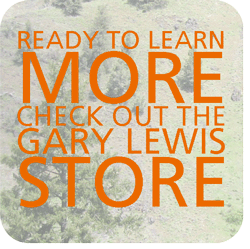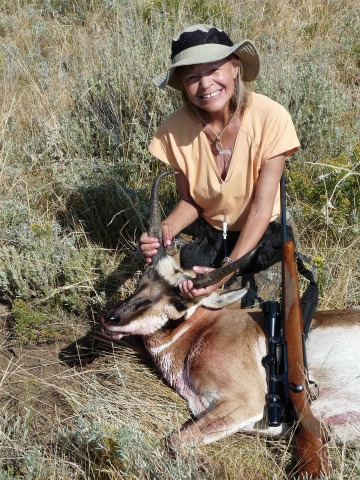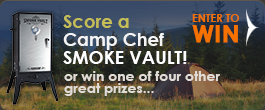In a Good Place
By Gary Lewis

"He was such a beautiful animal. He wasn't in his prime, but he had heart. And he turned out to be most tender."
Karen Smith had 14 points accumulated in the tag drawing for antelope, 14 years of unsuccessful applications.
"Why am I holding on to these points," she asked herself. "I'm going to apply for the Steens."
Karen Smith, of Bend, has a condition called hypokalemia which requires a constant IV potassium drip. Her symptoms include tachycardia (increased heart rate), tachypnea (increased rate of respiration), sweating and anxiety. "I pass out when my blood pressure drops, which it does often."
She carries a portable IV pump to maintain her independence.
"Because I have Crohn's disease, I can't absorb any nutrients, I take in three times the amount of potassium they give to inmates on death row. I am the only one that gets potassium like this outside of an intensive care unit."
She credits Dr. Pinnick, in Bend, who fought for her to have a potassium IV.
"He hates hunting season because he knows it will puts me in the minuses again, but now he understands hunting season is what keeps me going."
With a Steens Mountain antelope tag in her pocket, her resolve was greater than ever. Her best hunting partner, her husband of 17 years, Kelly Smith, would accompany her. They pored over maps and decided on a place to camp.
 On Roaring Springs
On Roaring Springs
A land swap several years ago, between the BLM and private interests, locked up Karen's favorite hunting grounds on the Roaring Springs Ranch. Karen wanted to see it one last time. She made the call.
When the ranch biologist called her back, he asked if she wanted to hunt on the property.
"There's a spring there, and an old cabin," she said. "I've been losing whole banks of memory, but I remembered it all, I knew every detail."
After some consultation with the biologist and with Kelly, Karen decided to hunt a lake to the west of Skull Creek. Through the spotting scope and binos, they located several small herds, including several bucks.
"I wasn't into the trophy as much as I was into a good hunt. I wanted a clean shot. That was my biggest thing. And I knew I wouldn't be able to do a lot of crawling," she said.
When they saw the truck start to close the distance, the bucks went over the hill. The Smiths went back to glassing.
"We saw a buck I recognized from the day before. He was old and broomed and he had a bunch of does. While I was watching, another buck came in and the old buck let him take the herd." The old buck walked away for the last time, without a fight.
"He was on a knoll and we were down below in the gully. The breeze was just right and he had a goal in mind and he was headed to a certain place."
Karen and Kelly stayed in the gully in tall sage brush and waited. The buck came over the hill, into view and dropped down into the gulley, headed away.
Kelly, without a rangefinder, was giving the estimated yardage to Karen. The gap widened, the buck moved in and out of sight in the sage.
"One-hundred-twenty," Kelly whispered. "One-thirty now. One-hundred-fifty."
"I didn't want to shoot further than that," Karen said later. She had shooting sticks because she didn't have the strength to hold the gun up for long. The buck quartered away, still moving when she had the crosshair steady on its shoulder. She pressed the trigger and tried to stay in the scope, but lost it in the recoil.
Kelly walked toward her and she let the gun rest on the sticks. They stared at each other.
Kelly spoke, "I have no idea whether you hit him or not. But I think you did."
Silent, they made their way through the sage. Kelly counted the steps and when they found the buck, it was 200 yards from where Karen had made her shot.
"It turned out to be the best shot I ever made, right behind the ear."
She had enough strength to do her happy dance.
"I sat beside the animal and said 'thank you.' And the tears came. It was the most perfect hunt. it didn't matter how much time it took, I had to do the dressing myself."
It was an old buck, with his horns splayed wide. He had broomed off the prong on one side and his teeth were almost gone.
"You could tell he was old, depressed and maybe a little tired. I just got so lucky. I was so full of these good feelings in a world that is full of pain and anger and sadness."
What seemed like a short walk to the antelope was a long way back to the truck.
The next day, the Smiths packed up camp and Karen wanted to get one more good look at the Steens and breathe deep of the experience. She finished with a fly rod in her hand and landed one of the best rainbow trout of her life.
"Our son came home to help us cut and wrap. That evening I cooked up a dinner of trout, antelope heart, liver, kidneys and gonads, and we talked of hunts over the years. I watched my family, knowing that they would have this and other wonderful hunting memories to remember long after I was gone."
Karen Smith is a former OHA board member and, prior to her illness, was involved at both the state and the local levels.
If there was a turning point in her life, it was when she joined the Oregon Hunters Association.
"I was a single parent and made sure my son hunted. I got into OHA because I needed information on how to make my son a responsible hunter, and responsible for the land, too. I needed people around me. I tried to glean as much knowledge as I could, and to have my son see the difference between the good and the bad."
Today, her son, Sean O'Neil, is a wildlands firefighter, 35-years-old.
"I was in Medford, was on the state board for OHA and met Kelly that way then moved to Bend. Sean had been a troubled child. Kelly taught that love can be constant. Kelly is one of the most responsible hunters I have ever met. He helped carry over some of the things I was teaching Sean. They have a bond. Him being a part of my son's life, I can never thank him enough."
For the 2015 season, Karen and Kelly planned to hunt eastern Oregon.
"I have way too much to do to lay around. This year, I'm doing the unthinkable, I'm getting the four-wheeler. I hate it. But I'm getting one," she said.
Karen hopes to use the four-wheeler to get back to the places she used to hunt that she wouldn't be able to reach otherwise.
"I'm living way past what I was supposed to live. Every minute is a blessing, every minute is filled with color."
A part of Karen is always looking faraway to southeast Oregon where those tall mountains stand high over the desert.
"The Steens are where I'm going when I'm at my end. That's paradise to me."
# # #
To order a signed copy of Gary Lewis’ Hunting Oregon, send $24.95 (includes S&H) to GLO, PO Box 1364, Bend, OR 97709 or visit www.GaryLewisOutdoors.com
The End


